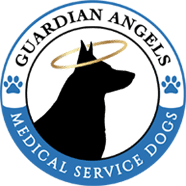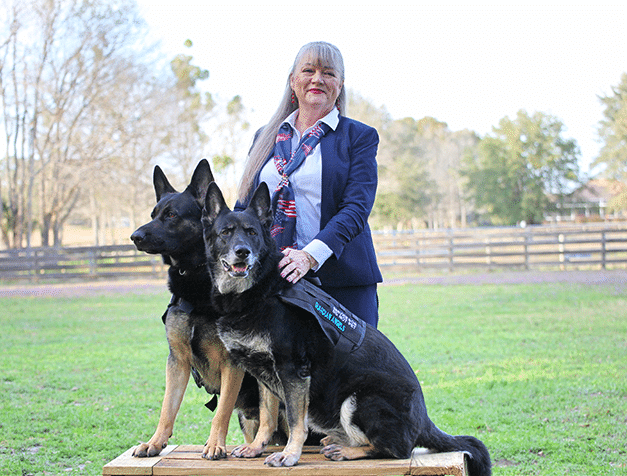A lot of businesses have suffered greatly through the pandemic. Thirty percent of small businesses and even some large businesses, including non-profits, closed their doors permanently in the last two years. It is estimated that another 10% of the remaining businesses have been so severely damaged that they may still permanently close in the next 12 to 18 months. However, there are businesses that did survive and even thrive.
We are enormously proud to say that Guardian Angels is one of those non-profits that not only survived COVID, but due to our talented team, we were able to make lemonade out of lemons. The first thing we did was to respond proactively when we realized the potential impacts of the pandemic very early on and saw that the country was shutting down.
How We Handled the Pandemic:
We were extremely concerned because we had a lot of people who were waiting for and depended on us for their service dogs to improve their lives and employees who depended on their paychecks to take care of their own families. We had 110 dogs in training at that time. We had to be concerned about getting the finished dogs into the hands of their recipients that were ready, having the continued income to be able to care for them daily, feed them, continue to provide all their veterinary care, etc., as we do normally on a regular basis. We had no idea how funding for our non-profit would be impacted.
The first thing we did as an executive team was to call an emergency meeting over that first weekend. We analyzed what we were faced with. We didn’t even know what we didn’t know at that time, and we needed to have a plan in place. We spent a whole Saturday working on scenarios A, B, and C. Were we going to be forced to cut down on our work staff? Would people be willing to take some pay cuts? What was the answer going to be to remain solvent?
Considering all the possible things that could be a negative consequence of the pandemic, we created a strategic plan and presented it to the staff. Immediately, we had staff members volunteering to say, “Hey, I can take a couple of weeks off” or “I don’t need to get paid.” In fact, as an executive team, “Option A” was that we would all forgo our paychecks for this organization for as long as necessary. That was the starting point. Fortunately, other options we put into place prevented anything beyond Option A.
Very quickly, we put multiple plans of action into place that led to our survival and further success.
How Our Donors Stepped Up to The Plate:
As the CEO, the next thing I did was to send out a personal letter and create a video with an urgent plea to all our donors. I explained that we do not know where this is going, and we need to make sure we can still feed our dogs, take care of their medical needs, get them to the recipients that were waiting, and take care of our skilled staff members. They totally stepped up to the plate.
Even if they did not send money, people sent bags of dog food. This was a gift from heaven. I was thrilled, as I quickly realized the level of loyalty our donors have for our mission. Because they had seen the success of our work over nearly 12 years, they were ready to help, to extend a helping hand in time of need. Normal grants had been rerouted, in-person fundraisers had been halted, and many of the things that we normally depended on for multiple avenues of revenue got shut down. Thankfully, the donors were still out there, and they did help us.
How We Implemented Technology into Our Organization:
When a lot of people cut back on certain things like payroll, expenses, networking, meetings, Zoom calls, and technology, that is when we upped our game. We focused on every possible networking and social media platform, direct mail, personal phone calls, and more. We became even more active by making sure we stayed in front of our donors giving them updates on how we were doing and that they were backing a winning team.
We used a lot of technology to our advantage by making countless videos, and by making Zoom calls a daily way of life to still be face-to-face even though it was virtually. We now do so many meetings that I think they tripled or quadrupled from what we used to do, but it has saved a lot on travel expenses while accomplishing new brainstorming sessions, sharing ideas, think tanks, and overall exploring ways that we can continue to adapt and overcome.
How We Kept Our Recipients Safe:
We did not want to ask our recipients, many of whom already have a compromised immune system, to travel to our headquarters to be paired like we normally do. Instead, one of the major things we did (we even made the national Fox News for this) was to have our trainers load up caravans of dogs and take them to the states where these trained service dogs were going to be paired with their recipients. We did the pairings in multiple states, so we were not asking these people to put their health at risk by potentially exposing them to COVID. We went to them, and we made sure that we overcame and adapted in a manner that we had not done ever before.
We were able to pair a lot of dogs this way. We had many dogs ready to go when COVID struck and the country started shutting down.
Ways That COVID Reshaped Guardian Angels:
I think a lot of it has to do with perseverance – not being afraid to try something new and different. It also gave us time to re-analyze some of our programs, the things we do and how we do them. In the first year, I came up with the idea to create a medical savings plan for our teams to help them with their veterinary bills. Many of our recipients live on limited disability incomes, making it difficult if a dog should get sick or get hurt and need some type of additional care. Through our new Medical Savings Plan, we were able to make their lives much easier by paying the veterinarian directly, so they were never out of pocket for those visits. Covid allowed us time to step back and develop a program where we can do more to help them.
We also had time to put further focus on our apprenticeship program. We have now developed this program with additional opportunities. In the meantime, we are starting another program called Skill Bridge, which will help our military members that are transitioning from the last six months of their service into civilian life. We are going to be able to bring them in and put them in a position where they will get six months of on-the-job training, and hopefully, that will help them find gainful employment in civilian life. They might even have a job waiting for them with us.
The next thing we decided was to be proactive and reduce our overhead by having our own veterinary hospital. With costs on the rise and the nearest emergency animal hospital facility being forty miles away, we decided it would better support our needs on many levels if we had our own veterinary hospital on campus. We had a wonderful donor step up and give us a grant for the hospital. It is now in progress and will be completed in April 2022. We will be hiring a veterinarian, the equipment is on order, and we will be able to do all our own spay/neuters and any other needed medical procedures. We are very excited about this new and valuable addition.
In further support of Guardian Angels, our new hospital and to always have the very best trained staff, I started an additional nonprofit organization during COVID. I started the Borden Institute of Higher Learning. Since I had already written a college-accredited, VA-approved curriculum to teach people how to become service dog trainers, I decided after COVID, with so many businesses shutting down and people losing their jobs, there might be a need for people to learn new careers – maybe try something they always wanted to do but could never break away from their regular job until the pandemic changed things.
We will now have the Borden Veterinary Hospital, which will eventually become a 24-hour emergency hospital not only for our campus but will eventually help our rural, low-income community. We will be able to do vaccination and spay/neuter clinics at a discounted rate which will help people and their dogs in this area. Because it is a teaching hospital, under the Institute, we will be teaching licensed veterinarian technician courses, nationally accredited veterinary assistance courses, kennel management, extra specialties such as acupuncture, physical therapy, and emergency veterinary medicine for dogs.
We will provide everything required for these courses to our students all on one campus – from the hospital to all the required animals for the program.
The most important piece for Guardian Angels is that we will be able to take care of our own dogs and teams under the supervision of our on-site veterinarian rather than having to depend on outside sources. We will be training potential new employees at the same time to meet our needs as we continue to grow.
COVID gave me time to come up with these ideas on how we can improve who we are and what we do. COVID turned lemons into lemonade for us. It gave us time to develop innovative programs that will help a lot of people and support Guardian Angels.
We are extremely excited about our progress while keeping our focus on the mission as we continue to create ways to strengthen who we are and what we do for the people we serve.
- How to Take Advantage of the CTU Patriot Scholarship - April 5, 2024
- Benefits of Service Dogs for Veterans - April 3, 2024
- The Art of Matching: How We Pair Service Dogs - March 19, 2024





